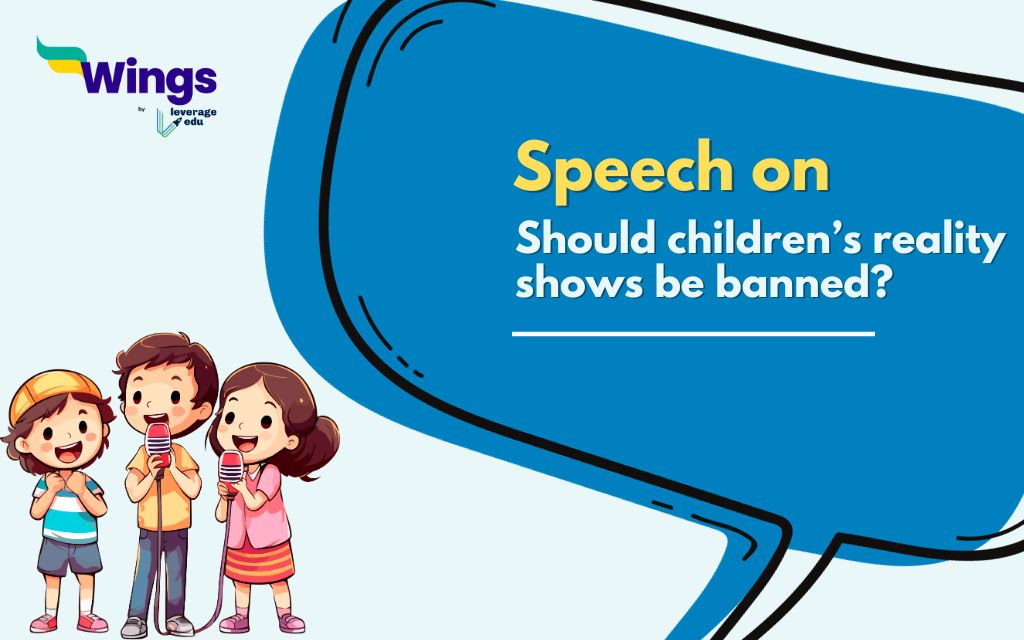Speech on should children’s reality shows be banned: Children’s reality shows are subject to debate. The subject divides people into two opinions about whether children’s reality shows should be banned or continue.
Those advocating for a ban on children’s reality emphasize the long-term impact on children’s mental well-being. Whereas, the opposing side can argue for the educational and skill-building benefits of children.
To analyze the views of both sides, we should weigh the pros and cons with ethical considerations regarding nurturing talent or resilience among young participants.
Also Read: Attention Deficit Hyperactivity Disorder (ADHD): How it Affects Students and Children?
5 Minutes Speech on Should Children’s Reality Shows Be Banned?
Greetings to all teachers and students gathered here. Today, I stand before you to deliver my point of view on whether children’s reality shows should be banned or not. In this speech, I have covered the possible reasons and concerns concerning both pros and cons.
Many critics point out that reality shows adversely impact the mental and emotional well-being of children, owing to the unnecessary pressure of performing well. Also, the race among children to beat others at any cost takes away empathy from young hearts.
Another point of concern from the point of contention is the potential impact on education. Participants who participate in children’s reality shows require a significant time commitment, which potentially interferes with a child’s academic responsibilities. Compromising between pursuing talent and maintaining a healthy educational environment is important to ensure children are not compromising their long-term well-being goal for short-term fame.
In addition to concerns about the participants, the critics of children’s reality show question the impact on the viewing audience. The glorification of reality television and its emphasis on winning at all costs may instill unhealthy values in young viewers. Instead of nurturing a sense of collaboration and companionship, these shows might inadvertently promote a cutthroat mentality that goes against the principles of healthy social development.
Some supporters argue that these reality shows positively influence children by inspiring other children to pursue their passions and big dreams. They believe that by showcasing diverse talents, these reality shows convey inclusivity and encourage viewers to embrace their individuality. Furthermore, they critically appreciate the skills of learning, practice, thinking, and communication that help the child process sensory information. And in due course, children’s television reality shows help them learn to evaluate, analyze, and understand causes and effects.
In conclusion, the debate over whether children’s reality shows should be banned is complex and complicated. While these television reality shows provide a platform for young talents and contribute to personal growth, the potential risks to children’s mental health, well-being, and educational pursuits cannot be overlooked.
Maintaining a balance that allows for the positive aspects of implementing measures to protect children’s participation is essential. Lastly, the decision should be made to prioritise the welfare of the children and should ensure that their involvement in reality shows aligns with ethical standards and promotes their complete development.
Also Read: IELTS Speaking Topic – Speaking Part 3: Influence of Television (Follow-up Questions)
10 Lines on Should Children’s Reality Shows Be Banned?
Let us understand the points of whether children’s reality shows should be banned or not within ten lines:
1. Children’s Reality Shows are commercial-based programs. The long-run ideas of these competitions take away precious time of the children from their childhood, which may include fun-loving activities and meeting friends.
2. Exposure to competition at a young age may lead to increased stress and anxiety in children.
3. Reality shows may encourage unhealthy rivalries and can affect relationship behavior among children.
4. The pressure to perform best can lead to a distorted sense of self-worth in young participants.
5. While participating in reality shows, children may prioritize fame over education, hindering their overall development.
6. The intense scrutiny of appearance and behavior can contribute to body image issues in children.
7. Reality shows often exploit children for entertainment, which raises ethical concerns about these shows.
8. Children, as participants in reality television, may struggle to cope with criticism, which affects their self-esteem negatively.
9. The aim of winning the show can overshadow the importance of teamwork and the children’s cooperative behavior.
10. Banning reality television shows can protect children from long-term psychological harm.
Also Read: Parental Pressure – Care But Not Too Much!
FAQ
Ans. Negative effects of children´s reality shows might include exploitation, stress, and distorted values which impact the mental health of a child.
Ans. Building confidence, teamwork, and entertainment skills are some of the advantages of reality shows that are for children.
Ans. Children can participate in reality shows but it is required to take caution as participation might include mental health impacts.
Ans. Children’s involvement in reality shows can cause exploitation and disrupt the normal development of their personalities.
Ans. Reality TV can negatively impact children by influencing their behaviour, self-esteem, and values.
Related Articles
| How to Become a Child Psychologist? | Speech on Child Labour |
| International Day of Innocent Children Victims of Aggression: A Call for Global Protection | Child Labour Day |
| Essay on Childhood: Samples in 100, 150 and 200 Words | Early Childhood Education |
For more information on such interesting speech topics for your school, visit our speech writing page and follow Leverage Edu.


 One app for all your study abroad needs
One app for all your study abroad needs












 60,000+ students trusted us with their dreams. Take the first step today!
60,000+ students trusted us with their dreams. Take the first step today!